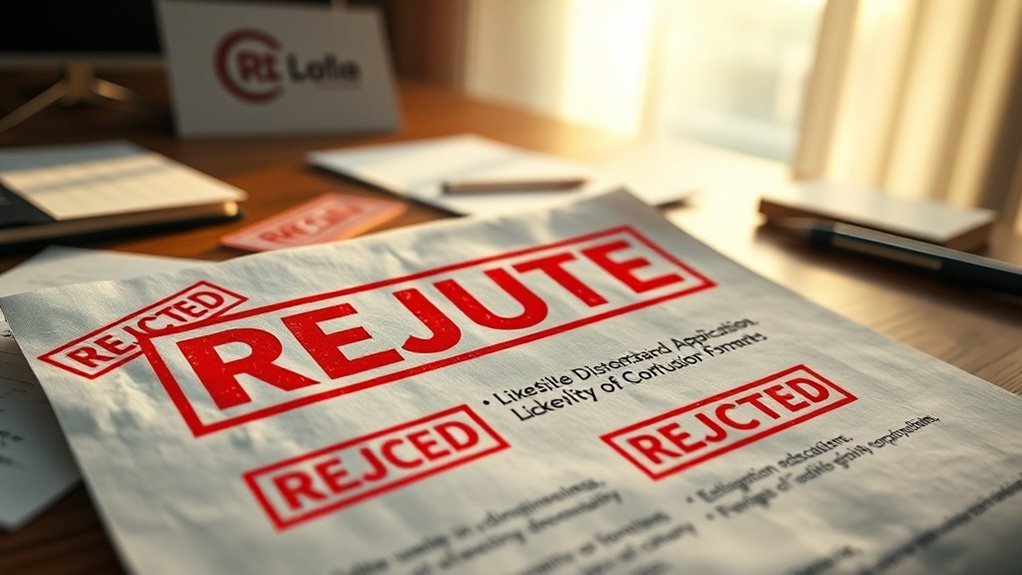Common Reasons for Trademark Rejection
Common reasons for trademark rejection in India include lack of distinctiveness, similarity to existing marks, and inadequate descriptions of goods or services. If your trademark is too generic or closely resembles another registered mark, it could be denied registration. Moreover, failing to provide the necessary documentation or if your mark is deemed deceptive or geographically descriptive may also lead to issues. To ensure that your application proceeds smoothly, it is crucial to have a thorough understanding of these aspects in accordance with Indian trademark laws and regulations.
Key Takeaways
- Lack of distinctiveness due to generic terms can result in trademark rejection under Indian laws, as such terms fail to identify a specific brand.
- Similarity to existing trademarks can increase the chances of rejection, particularly when goods or services belong to overlapping markets, creating potential for consumer confusion as per the Trade Marks Act, 1999.
- Vague descriptions of goods or services may lead to refusal, highlighting the importance of submitting clear and specific applications in compliance with Indian trademark regulations.
- Non-use of the trademark in the marketplace may lead to claims of abandonment, which can result in the rejection of the application under the provisions of Indian trademark law.
- Geographic descriptiveness and any deceptive implications in trademarks may lead to immediate rejection in accordance with Indian trademark regulations.
Lack of Distinctiveness

When applying for a trademark under Indian law, one of the primary challenges you may encounter is a lack of distinctiveness. This concept essentially indicates that your trademark doesn’t sufficiently stand out to distinguish your goods or services from those of others.
In India, trademarks must be unique or suggestive of the products or services offered; otherwise, they may be considered too generic or descriptive. For example, utilizing common terms or phrases can significantly diminish your chances of registration.
In India, a trademark must be unique; common terms can hinder your registration success.
It’s crucial to select a mark that not only captures the essence of your brand but also maintains originality. Engage in brainstorming sessions to create distinctive names or symbols that effectively communicate your brand message.
Remember that a distinctive trademark not only increases the likelihood of your application being accepted but also fortifies your brand’s position in the competitive Indian marketplace.
Adhering to these principles will enhance your brand’s visibility and recognition while navigating the trademark registration process in India.
Similarity to Existing Marks
When applying for a trademark in India, it’s essential to assess how similar your proposed name is to existing trademarks. Names that are confusingly similar, whether in terms of appearance or pronunciation, can lead to rejection, particularly if your business operates within a related industry. Familiarizing yourself with these aspects can help you navigate the application process effectively and avoid potential rejections based on similarity to existing marks. Additionally, monitoring trademarks and understanding the process of trademark opposition can further enhance your ability to protect your brand identity. Understanding the nuances of the Trademarks Act, 1999, and related guidelines can provide clarity and aid in the protection of your brand identity.
Confusingly Similar Names
Confusingly similar names can pose significant challenges for your trademark application under Indian laws. When you select a name that closely resembles an existing trademark, the likelihood of your application being rejected increases.
Here are three essential factors to consider:
- Market Overlap: If your product or service competes directly with a well-established brand, there’s a higher chance of consumer confusion. The Indian Trademark Act emphasizes avoiding names that may mislead consumers regarding the source of goods or services.
- Geographic Considerations: In India, even if you operate in different states or regions, similar trademarks can still lead to confusion, especially as businesses expand their reach. It’s essential to remember that the Indian market is quite diverse, and trademarks can have varying levels of recognition across different locales.
- Target Audience: If both your trademark and the existing one cater to the same demographic, the probability of confusion significantly increases. This factor is crucial, as the Indian Trade Marks Registry examines how closely the marks are associated with the same consumer base.
Conducting comprehensive research will help ensure that your trademark is distinctive and reduces the likelihood of rejection due to the presence of confusingly similar names. Additionally, understanding the distinct trademark classes can greatly aid in choosing a mark that stands apart from existing ones.
Always align your trademark strategy with the provisions of Indian trademark laws to enhance your prospects of a successful application.
Visual and Phonetic Similarity
A trademark’s visual and phonetic resemblance to existing marks can also lead to rejection during the application process under Indian law. If your mark looks or sounds similar to a registered trademark, trademark examiners may conclude that consumers could confuse the two, which can jeopardize your chances of obtaining approval.
This encompasses not just identical or closely resembling names, but also variations that may sound alike when articulated or exhibit visual similarities in style or design. For example, using the same letters or phonetic sounds can trigger complications, even if you believe your mark is distinct.
It’s crucial to conduct comprehensive research before submitting your application to identify potential conflicts with existing trademarks. Being proactive in this regard can save you considerable time and resources throughout your trademark registration journey in India.
Related Industry Overlap
If your trademark operates within a sector that overlaps with an existing mark, it can significantly influence the likelihood of your application being approved under Indian laws and regulations.
Trademark examiners in India typically assess how your mark may intersect with related or similar goods/services. Here are three pivotal factors they consider:
- Industry Similarity: The closer your business sector is to that of existing trademarks, the greater the chance of your application facing rejection. In India, it’s crucial to conduct a thorough search of existing trademarks in related industries.
- Target Audience: If both trademarks cater to the same consumer demographic, there’s an increased potential for consumer confusion. This is particularly important in India, where brand recognition plays a key role in marketplace decisions.
- Functionality: If your trademark describes the function or purpose of a product that resembles established brands, it may be deemed too generic. In Indian trademark law, distinctiveness is essential for registration, and marks that lack it may be challenged.
Understanding these overlaps can aid you in navigating the application process more effectively and enhance your chances of approval within the Indian trademark framework. It’s important to prepare a well-crafted response to a trademark objection to avoid rejection of your application.
Inadequate Description of Goods or Services
When applying for a trademark in India, it’s crucial to provide a clear and comprehensive description of your goods or services. A vague or overly broad description can lead to rejection of your application by the trademark office.
It’s important to clearly define what your product or service is and how it distinguishes itself from others in the market. For example, rather than simply stating “clothing,” a more specific description would be “premium activewear for women.”
This level of clarity aids the examining authority in understanding your offering and minimizes the risk of confusion with existing trademarks.
Keep in mind that a detailed description not only supports your trademark application but also helps in building a strong brand identity.
Therefore, take the necessary time to carefully articulate what you’re offering—this can significantly enhance your chances of obtaining trademark approval under Indian laws and regulations.
Trademark Use Requirements

Understanding your trademark’s use requirements is crucial for securing and maintaining trademark protection in India. Failing to meet these requirements may result in the rejection of your application.
Understanding your trademark’s use requirements is essential for successful protection in India; non-compliance could lead to application rejection.
Here are three essential use criteria to consider:
- Actual Use: It’s important to demonstrate that your trademark is currently in use in the marketplace, as opposed to merely being planned for future use.
- Continuous Use: You must ensure that the trademark continues to be in use without interruption. Prolonged periods of non-use could lead to claims of abandonment.
- Proper Specimens: You’re required to submit appropriate specimens that illustrate the trademark’s use in commerce. This can include labels, tags, or advertising materials that serve to validate its utilization.
Adhering to these requirements can significantly enhance your application and improve the likelihood of approval under Indian law and regulations.
Generic Terms
Generic terms are often a significant obstacle in trademark applications under Indian law due to their lack of distinctiveness. If you’re considering a name for your product in India, it’s crucial to recognize that utilizing a generic term can lead to rejection of your application.
For example, attempting to trademark “Bread” for a bakery would be insufficient since it’s a common term. Generic terms denote the general category of goods or services and don’t serve to identify your specific brand, leading to a scenario where consumers won’t exclusively associate the term with your product.
Instead, you should think creatively and strive for terms that convey your brand’s unique identity. By steering clear of generic names, you can enhance your trademark’s prospects for approval and help secure a strong market presence. Therefore, during your brainstorming process, it’s essential to avoid words that merely describe the product itself in order to meet the distinctiveness criteria set forth by Indian trademark law. Additionally, understanding the requirements for a proper assignment and licensing of trademarks can further bolster your brand’s legal protection and market position.
Deceptiveness

While many applicants may not realize it, deceptive trademarks can lead to immediate rejection during the registration process in India. A trademark is considered deceptive if it misleads consumers about the nature or quality of the goods or services.
To avoid rejection under Indian laws and regulations, keep these points in mind:
- Material Misrepresentation: Ensure your trademark doesn’t falsely suggest that a product or service has unique characteristics it doesn’t possess, as this could conflict with the Trademarks Act of 1999.
- Consumer Perception: Consider how your target audience in India will interpret your trademark. If it could create confusion or misrepresentation, it’s likely to be deemed deceptive by the Registrar of Trademarks.
- Association with Geographic Locations: Avoid terms that imply a geographic origin that’s not accurate, as this can mislead consumers regarding the product’s origin, potentially violating Section 9 of the Trademarks Act.
Being mindful of these factors can help protect your trademark application from rejection in India.
Failure to Provide Necessary Documentation
When applying for a trademark in India, it’s crucial to provide all the necessary documentation; failure to do so may result in rejection of your application.
It’s imperative to ensure that you submit all required documents, including proof of use, a clear representation of the trademark, and identification details. Omitting any of these documents can lead to significant delays or outright denials.
Furthermore, the trademark office may request specific documents to substantiate your claims, so it’s important to be prepared for such requests. The entire trademark registration process can take several months, so timely submission of documentation is essential to avoid potential delays in your application.
Be ready to provide additional documentation if the trademark office requests further evidence for your application.
If you’re uncertain about the necessary documentation, seeking guidance from a legal expert who specializes in trademark law is advisable.
Geographic Descriptiveness
Another common reason for trademark rejection under Indian laws and regulations is geographic descriptiveness. If your trademark directly references a specific location within India, it might be deemed too descriptive, making it challenging to protect.
Here are three key factors to evaluate:
- Specific Location: If your trademark includes the name of an Indian city, state, or region, it’s likely considered too descriptive under the Indian Trademark Act.
- Consumer Perception: Assess how consumers perceive your trademark in the Indian market—if they see it primarily as indicating a geographic origin, it may face rejection during the application process.
- Competitive Landscape: Reflect on whether other businesses in India utilize similar geographic terms; if so, your trademark could be viewed as generic and unprotectable.
Ultimately, ensuring your trademark isn’t tied to a specific location in India can enhance its chances of approval under prevailing trademark laws.
Questions
How Long Does the Trademark Registration Process Typically Take?
The trademark registration process in India typically takes around six to twelve months, but this timeline can vary based on several factors. If there are no objections or issues raised during the examination process, the approval may be quicker; however, that is not always guaranteed. Factors such as the complexity of the application, potential opposition from third parties, and the workload of the trademark office can all influence the overall duration of the registration process.
What Is the Difference Between a Type of Trademark and a Brand Name?
In the context of Indian laws and regulations, a type of trademark serves to legally identify and distinguish goods or services in the market, providing the owner with legal protections under the Trade Marks Act, 1999. This legal framework helps in preventing unauthorized use of a trademark that could mislead consumers. On the other hand, a brand name functions as the marketing identity established by a business to create recognition and loyalty among consumers. While both concepts are interconnected, the distinction lies in the fact that a trademark is inherently tied to legal rights and protections, whereas a brand name is more focused on the perception of consumers and the overall branding strategy of a business.
Can I Trademark a Name That Is Similar to a Famous Brand?
In India, you cannot trademark a name that is similar to a famous brand, as it may lead to confusion among consumers. The protection of their reputation is crucial for well-known brands, so it is advisable to choose a name that is distinct and unique. To avoid legal complications and ensure compliance with Indian trademark laws, it’s important to conduct a thorough search for existing trademarks before applying for registration.
What Are the Costs Associated With Filing a Trademark Application?
Filing a trademark application is an important step for protecting your brand in India. The cost of filing is influenced by the chosen method and the class of goods being registered. It’s also essential to consider that engaging legal counsel can provide valuable assistance throughout the process and may impact your overall expenses.
Is Trademark Registration Necessary for Business Protection?
Yes, trademark registration is essential for business protection under Indian laws. It legally safeguards your brand, preventing others from using similar marks. Without registration, you risk losing exclusive rights, making it more challenging to enforce your brand identity in case of infringement. Moreover, having a registered trademark can enhance your business’s credibility and provide legal recourse in disputes. Therefore, obtaining a trademark is a crucial step for any business aiming to secure its brand in the competitive Indian market.







